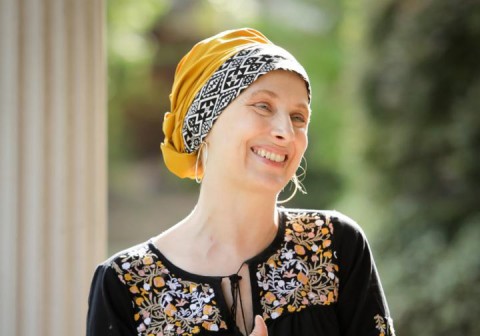
Anya Krugovoy Silver’s death, when I heard about it yesterday, knocked the breath out of me. Not because I didn’t know she was ill. She was often called the “breast cancer poet,” although she disliked that title. When I talked with her at the Festival of Faith and Writing in April, she seemed frail. But she lived so vivaciously that it was easy to forget how sick she was. She reminded me of her illness a few weeks ago when, during an email conversation about identity markers and diversity, she joked, “I always think of myself as ‘middle aged white woman—but there’s cancer!’”
I laughed out loud at her joke. It’s not that I’m insensitive to how painful cancer is for people afflicted with it and those who love them. I laughed because it was so thoroughly typical of Anya to say something like that. Her cancer was never her primary identity marker: it was always a but. I am a full human being, but I happen to have cancer. In a June interview, she put it this way: “I am not my disease. I am a complete person with a complete life. Having cancer doesn’t make one incapable of joy and wonder, and it doesn’t preclude loving food, wanting to have sex, worshipping God, and parenting children.”
Yet, many of her recent poems contain imagery related to cancer and its treatment: the way it ravages a body, the relief that a simple gesture or a grape popsicle can bring, the pain of surviving a loved one’s death, the funniest and most tragic things her friends with cancer have said to her. In all of it, Anya’s faith—which was wrapped up with deep, honest questioning of God—is the underlying pulse. “I agree with theologians who believe that God has a lot to answer for, but I also believe that human beings have a lot to answer for,” she said in the same interview.
Anya wasn’t the only Christian writer to remind us that living with cancer can yield theological insight. (Jason Micheli, Deanna Thompson, Todd Billings, and Kate Bowler have written beautifully about living faithfully and fully with stage-serious cancer.) But Anya was the most poetic. “Why not praise cancer, relentless, blind, / that seeks and finds the lymph and blood?” she asked in a poem published two years after her diagnosis. “Because I am unthankful, rude. / Because if I linger over this gift, / I will change, I will vanish from the earth.” Yet, in the same breath she bravely considered the possibility that beauty might be hidden within even the most horrific aspects of creation: “The pathology report an icon; the tissue / staining the slide, God’s kaleidoscope.” I wasn’t surprised when I learned that Anya had won a 2018 Guggenheim Fellowship. Her poetry is just that good.
Anya saw the world in colors, both bright and pale. When I first saw her 2017 poetry collection, Second Bloom, I was struck by how often colors appear in the poems—and they aren’t pretentious colors like gingerline or wenge. They’re ordinary blues and greens, reds and purples, the colors of everyday life. Color is simply a part of life, Anya’s poems reminded me. So, for many people, is cancer. And joy. And intense pain. And hope despite it all.
Poetry helped Anya grapple in a unique way with the paradox of living while dying, a paradox that belongs to all of us but most poignantly to those who are terminally ill. In a 2016 interview, she reflected on this reality using imagery of order and chaos: “I like Edna St. Vincent Millay’s assertion that ‘I will put Chaos into fourteen lines / And keep him there.’ Ultimately, if there is any underlying order in the world, I don’t think that human beings are privy to it.” Yet, she was neither nihilistic nor resigned to dwelling in noetic failure. Poetically naming what she didn’t know helped her to name what she did know and who she could trust.
Thus, she was able to claim with confidence:
Here’s what I’ve learned: God is with me. God is not just watching from above. God will not decide whether I live or die by how often I pray. God is with me the most when I am at my most lonely and afraid. God will be there for my son. When I call for help, I feel God’s presence in calm and peace. As God tells the reader in Isaiah 45:7 (KJV): “I form the light, and create darkness: I make peace, and create evil: I the Lord do all these things.” I interpret these enigmatic words not to mean that God literally created and gave me my cancer, but that God is in all things, both the light and darkness, the peace and the evil. Where evil exists, God does not absent God-self.
For Anya’s faithful witness, for her theological wisdom, and for her ability to evoke faith with unexpected twists of language, I am immensely thankful. These are gifts worth lingering over.






